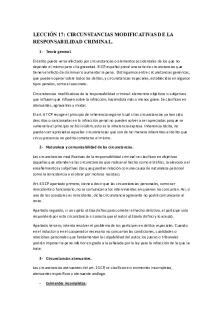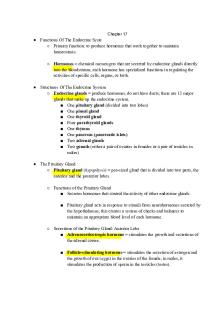Lecture 17- Inchote Offences-Part1-Attempts PDF

| Title | Lecture 17- Inchote Offences-Part1-Attempts |
|---|---|
| Course | Criminal Law |
| Institution | Aston University |
| Pages | 4 |
| File Size | 212.9 KB |
| File Type | |
| Total Downloads | 79 |
| Total Views | 132 |
Summary
Criminal law notes...
Description
Lecture 17: Inchoate Offences: Part 1: Attempts: What are Inchoate Offences: - Inchoate literally translated means “at an early stage” - Are crimes where D hasn’t actually committed a substantive offence but has taken steps towards committing it - Amount to criminal offences in themselves - Conspiracy and aid and a bet are other examples When will an inchoate offence be committed? 1. When D attempts to commit offence - Meaning of “Attempt” = to commit a criminal offence is some conduct by the D with the aim of committing a criminal offence which, for some reason, doesn’t succeed/is abandoned - E.g. D Shoots at V intended to kill him but the bullet misses- is attempted murder - D put his hand into the Vs pocket intending to remove the wallet which he believes to be there but there is no wallet in the Vs pocket- is attempted theft - S1(1) Criminal Attempts Act 1981 states an offence of attempt is committed if… “with intent to commit an offence …a person does an act which is more than merely preparatory to the Commission of the offence” - Khan 1990- related to old law of attempted rate- crime indicated recklessness 2. When D enters unto a conspiracy with at least 1 other person to commit offence 3. When D assists/encourages someone else to commit a crime (but unlike secondary liability the crime hasn’t been committed) AR: 1. D does an act which is more than merely preparatory to the commission of the offence (any offence triable on indictment/either way) - Any positive act suffices- not possible to commit a crime by omission (e.g. failure to provide a breath test) - D must intend to attempt the offence- not possible to commit an offence which doesn’t include intention in its MR such as attempted manslaughter - No liability for attempt of a summary offence unless parliament creates a specific statutory provision stating that there should be- for the offence of drink driving ,e.g. the Road Traffic Act 1988 provides that it’s an offence to drive/attempt to drive after drinking more than the prescribed limit; Mason v DPP 2009, Moore v DPP 2010 - It’s possible for an act done in another country to amount to an attempt to commit a crime in England. In DPP v Stonehouse 1978 accused went to Miami, and there falsely staged his own death, so that his wife in England (who knew nothing of the plan) could claim on his life insurance policies. Convicted of attempting to enable his wife to obtain property by deception 2. The test of if D’s acts have gone beyond the merely preparatory stage is essentially a Q of fact for the jury - This is a matter of degree and S.4(3) requires the judge to find some evidence that meets the standard
-
-
MR: -
In Gullefer 1990 the required degree was held to be met when the accused has “embarked upon the crime proper” Cases must be decided on an individual basis with reference to past judgments Jones 1990- jealous ex-boyfriend, D knows his wife was having affair and points gun at V, V wrestles D and gun falls out Boyle and Boyle 1987 Litholetovs 2002 AG’s Ref (No1 of 1992) (1993)- man gets penis out whilst sitting by a girl and says he’s going to rape her- not attempted rape as it’s an early stage- rape has stage of penetration Tosti and White 1997- intended to break into barn, had required equipment to do this Toothill 1998- V was seen close to D and carrying sexual acts on himself and seen with knife, condoms, gloves- was attempted rape It makes no difference that the failure to complete the crime is because of intervention by the police, voluntary withdrawal, or some other reason.; Taylor 1859 Widdowson 1986 R v Bowles 2004 Gullefer 1990- D goes to dog race, put £10, dog was losing, in order to save his money, he jumps on track to make sure race was void and got money backattempted theft Campbell 1991- D needed money, got imitation firearm and threatening note, was 1yard into getting money, police stopped him- wasn’t a robbery Geddes 1996- would it be an attempted sexual assault against a child to be found in a public swimming baths changing room waiting for a child?
Of an attempt is D’s intention to commit an offence Attempt is a crime of specific intent and recklessness won’t suffice It must be shown that D intended to commit the result. It may be that the substantive offence can be committed recklessly, but D won’t be guilty of an attempt to commit that offence if intention can’t be proved (Millard and Vernon 1987 & Pace and Rodgers 2014) - E.g, criminal damage can be committed recklessly, but intention must be established if D is charged with attempted criminal damage. It will not be sufficient for the prosecution to prove that D was reckless as to whether he would destroy/damage property Murder Cases: - In attempted murder cases nothing less than an intent to kill will do (on a charge of murder an intention to cause GBH would suffice)- Whybrow 1951 - An intention to commit GBH would constitute attempted GBH only MR: - MR can take the form of direct intention or oblique intention (indirect); Pearman 1985
-
In relation to attempted murder, liability will depend upon weather D’s purpose was to kill, or alternatively, whether death was a virtually certain result where D knew this Relevance of Recklessness: - The CAA 1981 simply requires an intention to commit an offence and doesn’t distinguish between circumstances and consequences - The rule adopted by the courts is – though D must intend any consequence, it’s sufficient if he is reckless as to the existence of any circumstance, if recklessness as to that circumstance is sufficient for the full offence - E.g. to attempt the offence of Aggravated Criminal Damage, D must intend to destroy/damage property but it’s enough that he is reckless as to endangering life by doing so- A-G’s Reference (No 3 of 1992) Attempting the impossible (S1(2) & (3): - If the commission of the offence is impossible, obviously no one can be convicted of actually committing it, but it doesn’t follow that no one can be convicted of attempting to commit it - E.G, of when D can be guilty of an attempt to commit the offence which he expected to commit: 1. Outside intervention/D’s own incompetence- D is interrupted by the police/others/doesn’t possess sufficient means to accomplish his aim and commit the offence (e.g. D can’t break into a building because the locks are too strong) 2. Absence of a target object- empty pocket cases! D puts his hands into an empty pocket with intent to steal; or D bursts into V’s bedroom and shoots at the bed, which turns out to be empty 3. Legally impossible to commit – attempting to handle stolen goods despite no evidence that goods were in fact stolen- Haughton v Smith 1971 4. In all the above examples D will be guilty of an attempt if he has done an act more than merely preparatory - Cases which confirm that attempting the impossible can be a crime: - Shivpuri 1986- D was drug courier, was instructed to receive and transport thinking it contained heroin and cocaine, only had white powder in suitcase, convicted of attempting to be knowingly concerned in dealing prohibited drugs - Jones 2007- D solicited young girls for sexual activity, found a girl who he thought to be 12, when really, she was an undercover PO, convicted of in sighting child to engage in sexual activity, was attempting this Summary of Attempt: i. Attempt deals with conduct preceding the commission of the full offence, which is sufficient to attract criminal liability ii. It’s not possible in law to attempt to commit an offence triable summarily only iii. An attempt normally requires proof of a positive act iv. The act must be more than merely preparatory v. MR of attempt is an intent to commit the full offence
vi.
vii.
Although intention is required as to consequences in the AR of the full offence, recklessness as to circumstances will suffice if recklessness as to circumstances suffices for liability for the full offence D may be convicted in cases, unknown to D, the object of the attempt was impossible to achieve...
Similar Free PDFs

LecciÓn 17 - Lecture notes 17
- 6 Pages

Chapter 17 - Lecture notes 17
- 15 Pages

Chapter 17 - Lecture notes 17
- 7 Pages

ARTS 150 Lecture 17
- 4 Pages

Lecture 14-17 Transplantation
- 15 Pages

LEC17 - Lecture notes 17
- 28 Pages

Lecture 17 - Dr. Chard
- 3 Pages

Lecture 17- Child Protection
- 11 Pages

CH17 - Lecture notes 17
- 17 Pages

L18 - Lecture notes 17
- 2 Pages

17.SM Charts lecture
- 17 Pages

Tulips - Lecture notes 17
- 3 Pages
Popular Institutions
- Tinajero National High School - Annex
- Politeknik Caltex Riau
- Yokohama City University
- SGT University
- University of Al-Qadisiyah
- Divine Word College of Vigan
- Techniek College Rotterdam
- Universidade de Santiago
- Universiti Teknologi MARA Cawangan Johor Kampus Pasir Gudang
- Poltekkes Kemenkes Yogyakarta
- Baguio City National High School
- Colegio san marcos
- preparatoria uno
- Centro de Bachillerato Tecnológico Industrial y de Servicios No. 107
- Dalian Maritime University
- Quang Trung Secondary School
- Colegio Tecnológico en Informática
- Corporación Regional de Educación Superior
- Grupo CEDVA
- Dar Al Uloom University
- Centro de Estudios Preuniversitarios de la Universidad Nacional de Ingeniería
- 上智大学
- Aakash International School, Nuna Majara
- San Felipe Neri Catholic School
- Kang Chiao International School - New Taipei City
- Misamis Occidental National High School
- Institución Educativa Escuela Normal Juan Ladrilleros
- Kolehiyo ng Pantukan
- Batanes State College
- Instituto Continental
- Sekolah Menengah Kejuruan Kesehatan Kaltara (Tarakan)
- Colegio de La Inmaculada Concepcion - Cebu



